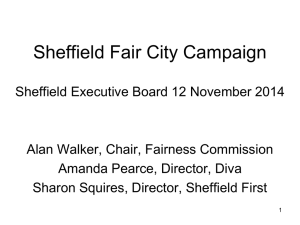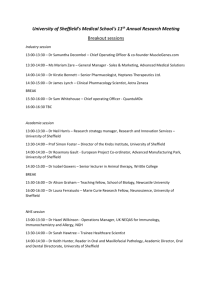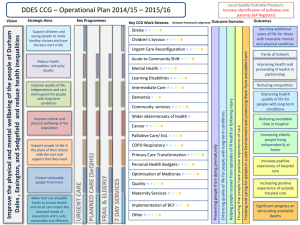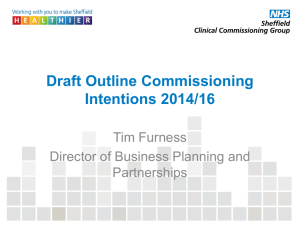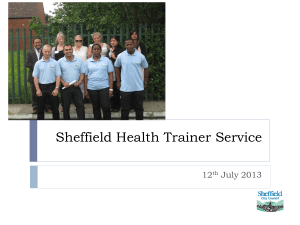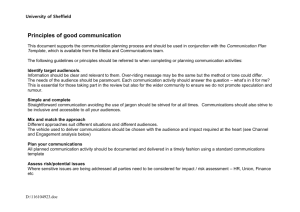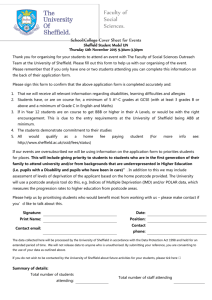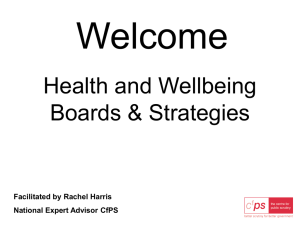Fairness Commission GB Paper April 2013
advertisement
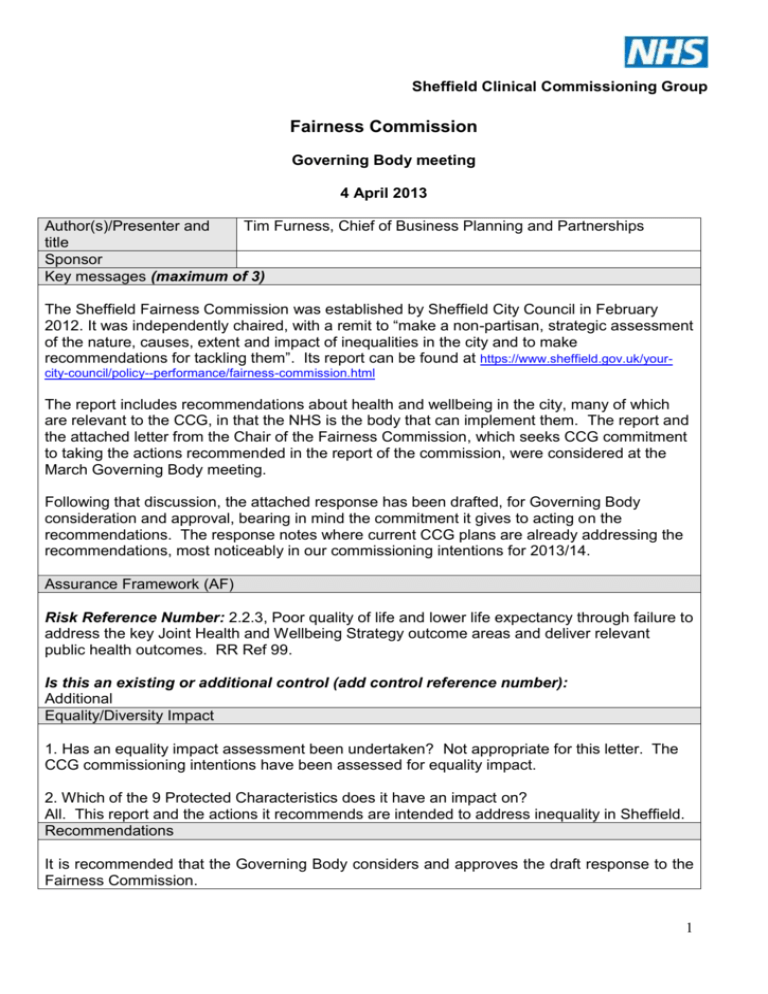
Sheffield Clinical Commissioning Group Fairness Commission Governing Body meeting 4 April 2013 Author(s)/Presenter and Tim Furness, Chief of Business Planning and Partnerships title Sponsor Key messages (maximum of 3) The Sheffield Fairness Commission was established by Sheffield City Council in February 2012. It was independently chaired, with a remit to “make a non-partisan, strategic assessment of the nature, causes, extent and impact of inequalities in the city and to make recommendations for tackling them”. Its report can be found at https://www.sheffield.gov.uk/yourcity-council/policy--performance/fairness-commission.html The report includes recommendations about health and wellbeing in the city, many of which are relevant to the CCG, in that the NHS is the body that can implement them. The report and the attached letter from the Chair of the Fairness Commission, which seeks CCG commitment to taking the actions recommended in the report of the commission, were considered at the March Governing Body meeting. Following that discussion, the attached response has been drafted, for Governing Body consideration and approval, bearing in mind the commitment it gives to acting on the recommendations. The response notes where current CCG plans are already addressing the recommendations, most noticeably in our commissioning intentions for 2013/14. Assurance Framework (AF) Risk Reference Number: 2.2.3, Poor quality of life and lower life expectancy through failure to address the key Joint Health and Wellbeing Strategy outcome areas and deliver relevant public health outcomes. RR Ref 99. Is this an existing or additional control (add control reference number): Additional Equality/Diversity Impact 1. Has an equality impact assessment been undertaken? Not appropriate for this letter. The CCG commissioning intentions have been assessed for equality impact. 2. Which of the 9 Protected Characteristics does it have an impact on? All. This report and the actions it recommends are intended to address inequality in Sheffield. Recommendations It is recommended that the Governing Body considers and approves the draft response to the Fairness Commission. 1 Fairness Commission Secretariat Policy, Partnership & Research, Room 302, Town Hall, Pinstone Street, Sheffield, S1 2HH Tel: 0114 273 4529 Fax: 0114 273 4694 Email: fairness.commission@sheffield.gov.uk www.sheffield.gov.uk/fairnesscommission 15th February 2013 Dr Tim Moorhead Chair of Sheffield NHS Clinical Commissioning Group Committee 722 Prince of Wales Road Darnall Sheffield S9 4EU Dear Tim I am writing to you with a copy of the Sheffield Fairness Commission’s report – Making Sheffield Fairer. The Commission sets out a bold vision for Sheffield as a city “that is eventually free from damaging disparities in living conditions and life chances, and free from stigmatising discrimination and prejudice, a place in which every citizen and community knows and feels that they will be treated fairly. We aspire to be the fairest city in the country.” Sheffield has made enormous strides in the last decade in reforming its economy, in improving health outcomes, and in raising educational attainment. However, as you will know, significant inequalities remain in the city and it is not one in which everybody has the same chances in life. In fact there are deep and persistent inequalities between different communities and groups of people. The Commission’s remit was to “make a non-partisan, strategic assessment of the nature, causes, extent and impact of inequalities in the city and to make recommendations for tackling them.” I was delighted to be offered the role of chairing the Commission because it is a once in a generation opportunity to tackle the inequalities that scar this great city of ours. The evidence we received from many experts convinced us that a social and economically divided city, damages not only the most deprived but, also, everyone else in Sheffield. This is because many social problems - from crime to mental ill health - worsen as inequality increases. 2 The Commission was well aware that there is a huge amount of valuable work taking place in the city to try and tackle the inequalities. However to achieve our aspiration for Sheffield to become the fairest city in the country we all need to do more. Our report is deliberately aspirational and sets out what we believe needs to happen over the next decade to make Sheffield a fairer city. There are two main aspects to our vision for the future: the Sheffield Fairness Framework which provides 10 principles to assist in making decisions; and a number of practical recommendations which would help reduce inequalities in the city. Progress against these recommendations will be assessed and made public every year. The Commission is certain that, unless a city-wide effort is made by all stakeholders and a wide range of residents, our vision will not be realised. For those recommendations which are relevant to your organisation I would be grateful if you would reply with answers to the following questions, if possible by the end of March: How do you plan to embed the Sheffield Fairness Framework within the decision making processes of your organisation? Which of the recommendations will your organisation implement? And over what timescale? Are there any recommendations that are relevant to your organisation which you cannot implement? If so, for what reasons? Some of the recommendations in the report will require responses across multiple agencies. Where this is the case I would be interested to know for which recommendations your organisation has a role to play, and for which of these recommendations it might be the lead agency. Thank you for your attention. I look forward to working with you and your organisation to make Sheffield a fairer city. Further copies of our report can be downloaded from the Commission’s website: www.sheffield.gov.uk/fairnesscommission Yours sincerely Prof Alan Walker Chair Sheffield Fairness Commission 3 722 Prince of Wales Road Darnall Sheffield S9 4EU April 2013 Professor Alan Walker Chair Sheffield Fairness Commission Fairness Commission Secretariat Policy, Partnership & Research, Room 302, Town Hall Pinstone Street Sheffield S1 2HH Dear Alan Recommendations of the Fairness Commission Thank you for your letter of 15 February. The CCG’s Governing Body has considered the report of the commission and your letter to me, and agreed this response. The CCG fully supports the work of the Commission and its recommendations. Contributing to reducing health inequalities is one of our four priorities as a new commissioning body, and the link between health inequalities and the other forms of inequality in the city are clear. I know that CCG Governing Body members have a strong personal commitment to addressing health inequalities, and we are very happy to support the Commission’s work. This commitment is expressed in our prospectus and will, we hope, be evident in our commissioning intentions for 2013/14, which we will publish in April. Although your letter was received towards the end of this year’s planning process, we hope you will agree that we have identified actions in the commissioning intentions for 2013/14 that at least start to meet your recommendations. (I have included a copy with this letter). For future years, we will start our planning process with the recommendations of the Fairness Commission clearly in mind – they will help us identify how we can contribute to reducing health inequalities. In addition, I expect that the refresh of the Health and Wellbeing Strategy will ensure that it incorporates the relevant recommendations of the Commission, and that in turn will guide our planning. With regard to your questions about the recommendations, I have addressed those in the table below. This sets out each recommendation we feel is relevant (including all those under the Health and Wellbeing for All heading), with a response to each one. 4 Health and Wellbeing for All Tackling the determinants of poor health 1. Commit to tackling wider Section 4.7 of our commissioning intentions determinants and use services (CIs) describes our actions to contribute to to deliver better health and reducing health inequalities. We recognise this wellbeing outcomes is work which needs to be done in partnership with others, and that many of the wider determinants are outside NHS influence, and will discuss this with partners. 2. Prevent health and wellbeing Many of our plans for 2013/14 seek to achieve problems from occurring this, including investment in health trainers, improvements in primary and community care and focus on long term conditions 3. Initiatives addressing the wider As above – largely outside NHS control determinants of health 4. HWB members utilise position, Tackling health inequalities is one of the influence and resources priorities for the HWB. HWB members recognise that position, influence over others and control of resources all have a part to play in bringing about change. 5. Health inequalities assessment A key feature of the JSNA that is being currently developed, as it will be themed around the HWB’s priority areas. 6. Promote women’s health in Section 4.4 of our CIs sets out our actions to general, pre-pregnancy, in improve maternity and children’s care. (Note pregnancy and after giving birth the Health Visiting service will be commissioned directly by the NHS Commissioning Board (NHSCB), not the CCG.) Inequalities in the health system 7. Use the JSNA to better The distribution of CCG health spend is largely a understand the equity of health consequence of patterns of use of secondary spend in Sheffield care services. Our actions to improve access to care and reduce health inequalities should, as a 8. Ensure that health spending in consequence, improve equity of health spend. the city is more fairly utilised We aim to target resources to areas and populations with the greatest need (CIs section 4.7) Spend on primary care is outside the CCG’s influence as primary care contracts will be held by the NHSCB. 9. Increase in primary and A key part of our plans for 2013/14 community care 10. Consistent, high quality services A key aim for the CCG - demonstrated in our across all areas of the city focus on the quality of care, and on reducing health inequalities. Tackling unwarranted variations in quality of primary care is an explicit action for 2013/14 (CIs section 4.6). 11. Removing barriers to service Our Equalities Action Plan (endorsed by the Governing Body in March 2013) is intended to tackle discrimination in provision in healthcare. It includes our intent to understand people’s experiences of problems in accessing care, so 5 that we can address those problems, and highlights how developments like Health Trainers will improve access to care. Initiatives already in place, like those to encourage people to take up cancer screening and report symptoms earlier, also contribute to this aim. Mental Health and Wellbeing 12. Supporting people to receive early diagnosis The redesign of community mental health services, which the CCG was consulted upon and supports, includes a new function in MH teams to improve liaison with primary care and provide faster assessment of patients. Improvement in CAMHS is included in section 4.4 of our CIs 13. Improve the diagnosis and treatment of mental wellbeing problems in children 14. Increase the prominence given The area of mental health and learning to mental health and wellbeing in disabilities is one of our four clinical portfolios commissioning plans and features clearly in our CIs (section 4.5). Our GPs are clear about the relative importance of mental health and we expect clinical commissioning to have a stronger focus on mental health than previous arrangements. 15. Commissioning services for the Identified in section 4.5 of our CIs as an action physical health care of people for 2013/14, we need to work with partners to with mental health problems understand how best to achieve this. In our work on health inequalities, we are clear about the need to address the inequalities in health outcomes for people with mental health problems (and people with learning disabilities). Carers 16. Making sure the right level of Care for children with complex needs is a respite care is available in the priority for 2013/14 (CIs section 4.4), as is care city for people with complex LD needs (CIs section 4.5). Access to respite care is a key part of that and we are working to improve this with Sheffield City Council. 17. Identify hidden carers This is a strand in the Carers strategy which we are working with SCC to implement. In relation to healthcare, general practice has an important role in recognising people’s caring responsibilities and the potential impact of those. 18. The special needs of older We have no explicit action currently planned lifelong carers are recognised with regard to this recommendation and would be happy to be advised on the part we might play. Fair Access to High Quality Jobs and Pay 19. Prevent discrimination in employment practice One of the themes of our Equality Action Plan is to prevent discrimination in our employment practice. 6 20. Expedite health and wellbeing actions in the Employment Strategy 21. HWB play a leading role in addressing wellbeing issues associated with work 22. Expedite development of a Health and Work plan for Sheffield Health and Employment is one of the work programmes in the Joint Health and Wellbeing Strategy, which the CCG has formally endorsed. CCG members recently took part in a review of employment and health issues, which focussed on this element of the Employment strategy. The review confirmed support for the strategy and the HWB will be asked to confirm that support. CCG officers have agreed to support implementation of the plan. Aspiration and Opportunities for All 23. Increase focus on communication and personal, social and emotional development skills of children and families Section 4.4 of our CIs includes a commitment to improving children’s Speech and Language Therapy A Safe City 24. Adapt and improve services in relation to domestic abuse Our predecessor, Sheffield PCT, has worked with STH to support improvements in the healthcare response to victims of domestic abuse. What Citizens and Communities Can Do 25. Join up existing activity to develop a single programme of community development We would be happy to work with partners to join up the work we commission (e.g. health trainers, mental health development workers, some of the VCF services we commission) where there would be a clear benefit in doing so. We would be happy to receive your thoughts on our response and to discuss those with you, if that would be helpful. I note that the Commission’s report clearly states that you will not be setting up performance management arrangements, but assume that you will be asking us to provide a progress report to the Commission, and will be happy to do that. Yours sincerely Tim Moorhead Chair NHS Sheffield Clinical Commissioning Group 7
